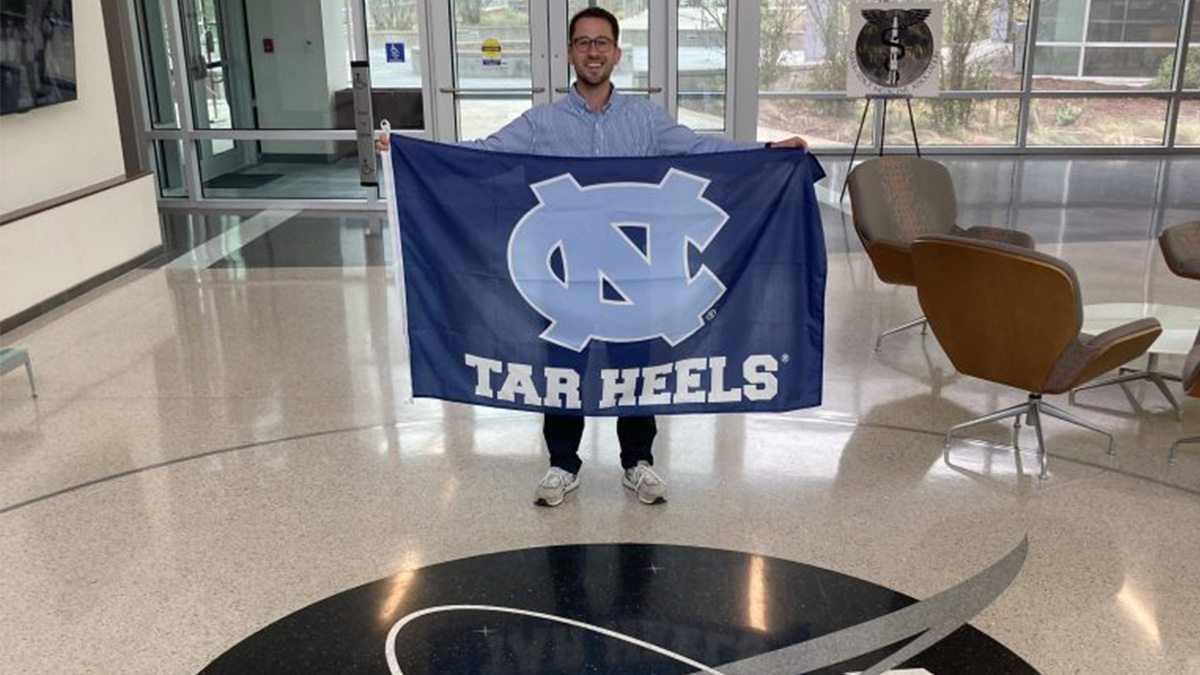Pharmacy student sets own course at NASA
Tom Diaz used a space center clerkship to explore aerospace medicine.

Fourth-year pharmacy student Tom Diaz’s interest in aerospace medicine took a giant leap forward this year when he became the first pharmacy student to attend the NASA/Johnson Space Center Aerospace Medicine Clerkship program in Houston, Texas. Aerospace medicine focuses on keeping people involved in air and space travel healthy and safe in some particularly challenging living conditions.
At NASA, Diaz toured the space center’s campus and facilities, met astronauts and heard lectures by NASA scientists. He also completed a research project on how genes affect a person’s response to drugs.
“This clerkship has essentially been a month-long structured course about aerospace medicine, so I’m learning from front to end about the field from experts. It’s been a hands-on experience that I wouldn’t have gotten anywhere else,” said Diaz, president of UNC Eshelman School of Pharmacy’s Class of 2024.
Because the four-week program is designed for medical students, Diaz reached out directly to the program’s coordinator for permission to apply and was accepted. His 14 fellow students were medical students, medical residents and practicing physicians, most of them members of the U.S. Navy, Air Force or Air National Guard.
Diaz’s research focused on how genetics can affect the safety and effectiveness of medication used by ground support and spaceflight crew members. Diaz worked on the project with NASA’s lead pharmacist, Tina Bayuse, and Sincy Mathew, clinical staff pharmacist at Johnson Space Center Pharmacy.
“Being able to do research during this was a huge opportunity,” Diaz said. “Doing research in this field is hard because you have to find either an individual or lab to partner with. In this clerkship, you get accepted and then you automatically get paired with a mentor and a research project.”
While there, Diaz presented his research to Johnson Space Center scientists and research mentors. He will also submit his poster for a presentation at the Aerospace Medical Association’s annual scientific meeting in 2024.
Diaz has pursued an interest in aerospace medicine for a while, joining AsMA, attending conferences and reading papers. He also co-founded Aerospace Medicine at Carolina, a subgroup of the national Aerospace Medicine Student and Resident Organization, to encourage interest in the field across Carolina’s campus.
“It’s been incredible to be able to meet a group of like-minded students and individuals in various stages of their careers,” he said of the NASA clerkship. “Another highlight has been learning from world-renowned experts. I’ve been reading all of these papers, noticing some recurring names, and now they are here in front of me sharing their research.”
His NASA experience gave Diaz a clearer picture of what his future career holds. He plans to pursue a two-year residency in clinical pharmacy, focusing on critical care, while staying active in aerospace medicine organizations and continuing his aerospace medicine research.
He is taking to heart the best advice he received during his time at NASA: “Find what you like, dive deep into it and become an expert in your niche interest.”







